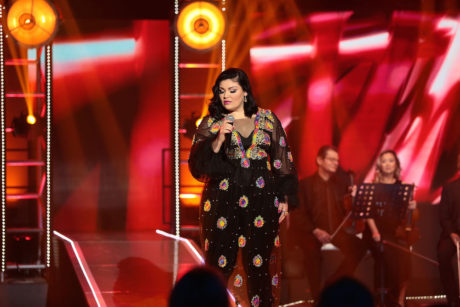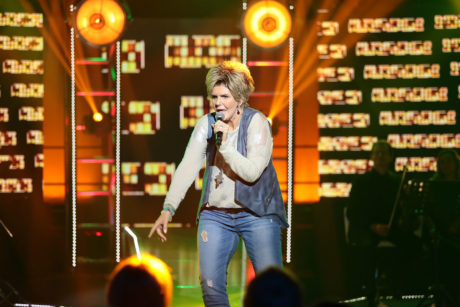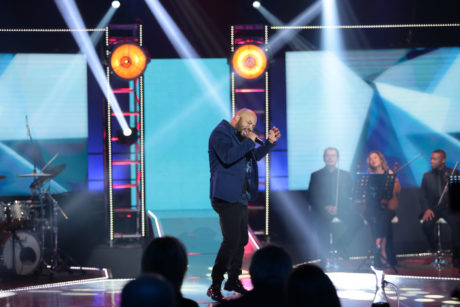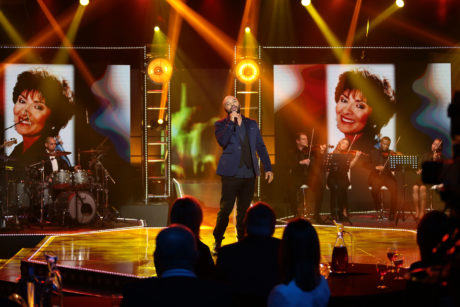
SOUTH AFRICA – “In Die Kollig” (Afrikaans for ‘In the Spotlight’) is a brand-new TV music show in South Africa produced by one of the country’s most famous TV personalities, singer and entertainer Johan Stemmet, recently broadcast on SABC 2.
More details from Robe (www.robe.cz):

The first series’ episodes were produced by Stemburg TV and recorded at the Urban Brew Studios at Randburg Waterfront, and the show was creatively lit by Ryan Lombard, HOD of Lighting at Blond Productions … using around 100 Robe moving lights and other fixtures. All the lighting and video equipment was supplied by Blond Productions.
Each show featured a local music artist whose story was revealed thorough a series of 12 songs, which included a tribute, a ‘legend’ song, a duo, and other variants etc … so there were also plenty of guest spots and surprise appearances to keep it pacey and interesting!
The intense 7-day shoot schedule entailed recording two episodes per day, so Ryan had to light 24 songs – each one looking different and unique! That was the challenge, and the reason he chose Robe moving lights to assist.
The initial set design was a collaboration with Dream Sets, after which Ryan and Christiaan Ballot – owner and founder of Blond Productions, now one of the leading South African TV lighting and production specialists – were asked for their input. They also specified the video screens at this stage.
Once the set details were finalized, they started working out the lighting positions. Ryan had plenty of creative freedom as director Anne Williams and he have worked together before, and she knew he would deliver the required atmospherics and mood.
Three U-shaped trusses were installed in the roof of the studios to provide most of the lighting positions. The upstage one was the widest, with the other two reduced in size proportionately to give a shrinking perspective effect.

One of the briefs from the producers was that they wanted it to look huge on camera, yet also capture the intimate, cabaret style vibe, with guests sitting at tables around the performance space, rather than on traditional tribune seating.
Other lighting positions were provided by truss totem towers positioned around the stage at floor level.
Rigged on these were 36 x Robe LEDBeam 100s, 12 x miniPointes, 12 x MMX Spots, 18 x LEDWash 300s, 12 x 600E Beams and eight PATT 2013s, plus a selection of LED PARs, and battens.
The little LEDBeam 100s were the main effects lights of the show and provided the most spectacular eye candy looks. Ryan mostly ran them at only 10 – 20% brightness to be subtler with the effects, a ploy that worked better for all the low angle camera shots.
The miniPointes were a key fixture together with the MMX Spots and 600E Beams. They were used extensively throughout all the songs, sometimes in static scenes to create mood and ambience, and other times strobing and flashing to ramp up the excitement and razzamatazz!
Ryan has used Robe products on numerous projects in the last 10 years since he’s been working for Blond, and the miniPointe is currently one of his favorite fixtures. “It’s plenty bright for the camera and you can almost do a whole show just using prisms and three or four colors.”

The MMX Spots were perfect for washing the main set and floor area, for defined beams and nice simple zoomed-in gobo looks, while the LEDWash 300s were a major source of back-light and great for washing and augmenting the performance area.
The lighting console was a grandMA2 light with a grandMA2 NPU, also running an MA VPU with all the video content that Blonde compiled specially for the production.
Ryan programmed furiously during each available two-hour session, creating all the effects lighting and major looks, while Alisdair Richards took care of the ‘classic’ television lighting elements like key lighting, perfecting flesh tones and eliminating shadows, for which he used a different system comprising 40 x 2K fresnels, 12 x ETC Source Fours and two Robert Juliat Topaze follow spots.
The programming slots were the end of the day before for the next morning’s episode, and in the break after the first recording of the day … for the second show, so it was tight, although Ryan admits that he loved meeting the challenges! Rehearsals were also recorded for potential inclusion in the show, adding more pressure for all on the production side.
The camera session for recording the artist close ups was the only ‘rehearsal’ Ryan and Alistair had for what was to come … so they needed to get every cue bang-on as the first time they saw the actual show was when it was on camera!
The set featured seven separate screens, five built using 48 x 6mm LED panels which were more abstract in shape, so the graphics were scaled exactly to fit. The two high def 7 x 4 meter side screens were built from 56 x panels of 2.9 mm LED – also from Blond.
Ryan enjoyed lighting all the stars taking part for different reasons, however Afrikaans singer Jannie Moolman possibly stood out the most.
“The overall tempo of his show was relaxed,” he explained “it wasn’t packed with of whiz-bang moments but seeing it on camera for the first time I realized just how dynamic the design looked and how it worked in so many different contexts.”
For Moolman’s closing number – a big anthemic operatic style rendition – Ryan unashamedly visually subverted … with the help of a large disco-tastic glitter ball, an effect that left everyone stunned, amazed and talking about it!


